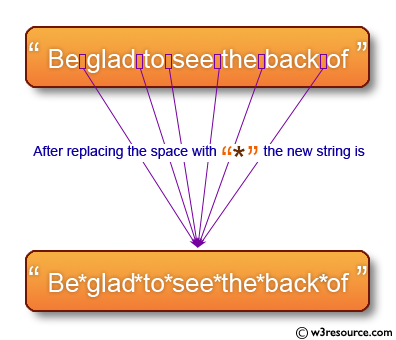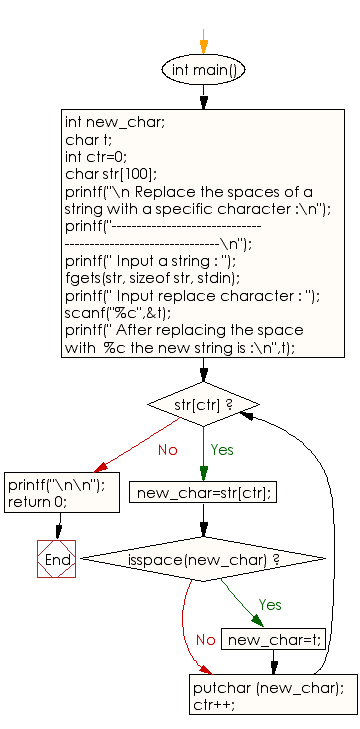C Programming: Replace the spaces of a string with a specific character
C String: Exercise-25 with Solution
Write a program in C to replace the spaces of a string with a specific character.

Sample Solution:
C Code:
#include<stdio.h>
#include<ctype.h>
int main()
{
int new_char;
char t;
int ctr=0;
char str[100];
printf("\n Replace the spaces of a string with a specific character :\n");
printf("-------------------------------------------------------------\n");
printf(" Input a string : ");
fgets(str, sizeof str, stdin);
printf(" Input replace character : ");
scanf("%c",&t);
printf(" After replacing the space with %c the new string is :\n",t);
while (str[ctr])
{
new_char=str[ctr];
if (isspace(new_char))
new_char=t;
putchar (new_char);
ctr++;
}
printf("\n\n");
return 0;
}
Sample Output:
Replace the spaces of a string with a specific character : ------------------------------------------------------------- Input a string : Be glad to see the back of Input replace character : * After replacing the space with * the new string is : Be*glad*to*see*the*back*of*
Flowchart :

C Programming Code Editor:
Have another way to solve this solution? Contribute your code (and comments) through Disqus.
Previous: Write a program in C to check whether a letter is uppercase or not.
Next: Write a program in C to count the number of punctuation characters exists in a string.
What is the difficulty level of this exercise?
Test your Programming skills with w3resource's quiz.
C Programming: Tips of the Day
Static variable inside of a function in C
The scope of variable is where the variable name can be seen. Here, x is visible only inside function foo().
The lifetime of a variable is the period over which it exists. If x were defined without the keyword static, the lifetime would be from the entry into foo() to the return from foo(); so it would be re-initialized to 5 on every call.
The keyword static acts to extend the lifetime of a variable to the lifetime of the programme; e.g. initialization occurs once and once only and then the variable retains its value - whatever it has come to be - over all future calls to foo().
Ref : https://bit.ly/3fOq7XP
- New Content published on w3resource:
- HTML-CSS Practical: Exercises, Practice, Solution
- Java Regular Expression: Exercises, Practice, Solution
- Scala Programming Exercises, Practice, Solution
- Python Itertools exercises
- Python Numpy exercises
- Python GeoPy Package exercises
- Python Pandas exercises
- Python nltk exercises
- Python BeautifulSoup exercises
- Form Template
- Composer - PHP Package Manager
- PHPUnit - PHP Testing
- Laravel - PHP Framework
- Angular - JavaScript Framework
- Vue - JavaScript Framework
- Jest - JavaScript Testing Framework
